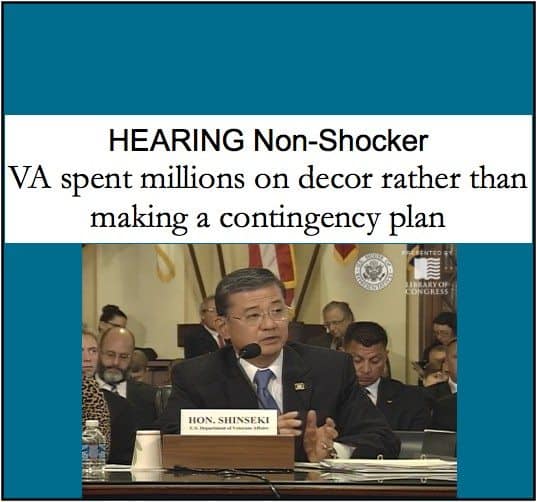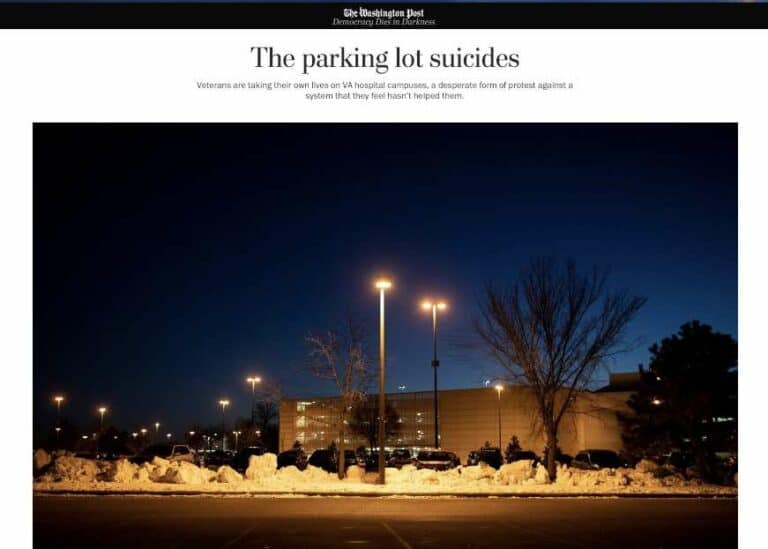Shinseki: Prolonged Shutdown will Impact 5.18 Million Veterans
The hearing uncovered what the root of the problem is: veterans and their benefits are being used as pawns. That much is clear.
In light of what I am about to say, keep in mind that Secretary Shinseki and many within VA are all political appointees. Many of these appointees are either working toward becoming Representatives or Senators or have had a shot and lost.
For example, two years ago, I heard rumors that Shinseki was slated to take over Senator Akaka’s seat in Hawaii, but the backlog and related scandals have hurt his chances.
This could be taken to mean VA appointees are even more political minded that sitting elected officials.
For that reason and others, Democrats will usually be easier on politically appointed officials when they were appointed by a Democratic president. The same is true of Republicans when there is a Republican president.
During this hearing, Republicans were harder on Shinseki than Democrats.
My take on VA’s shutdown post hearing
Congress apparently suspected there could be a shutdown back in 2009, so they passed legislation to pre-fund VA. VA apparently failed to notice.
To avoid veterans being used as pawns, Congress pushed for one year of advanced funding for VA. That push resulted in only the health care side of VA receiving advanced funding but not the benefits side. Perhaps this is because the benefits side is dramatically more expensive than the health care side but has less employees.
Regardless of the reasoning, shame on the House of Representatives and the Senate for letting this happen.
Further, shame on VA for not having a contingency plan in place prior to the shutdown. The hearing revealed that in September, Washington DC knew well that a shutdown was very possible. However, VA was not on the same page with DC, and not even in the same ballpark. Instead, Veterans Affairs recklessly spent millions on art, photography and advertising last month.
During the hearing, Secretary Shinseki admitted that VA had not developed a responsible contingency plan in advance, because VA did not expect the shutdown would happen. As a result, the veteran community has been left scrambling to find answers.
I have a hard time believing that a $150 Billion agency did not plan for most if not all contingencies. I thought military generals usually develop contingency plans while commanding troops. I’m surprised that the now retired generals in charge of VA forgot their basic planning strategies they learned from West Point and the Air Force Academy.
What private company would do that?
What human being with average common sense and intelligence would see a bus coming and not look to see how they can get out of the way?
Aggregate of the House Committee Hearing
Overall, Secretary Shinseki craftily diverted attention from the Senate’s refusal to vote on a VA full funding bill that was passed 4 months ago by the House. Instead, Shinseki would only refer to the issue of funding as Congress’s failure to pass a budget.
Shinseki did confirm that he has not spoken with Senator Harry Reid about the funding bill. Senator Reid does control the calendar and does have the ability to bring the budget previously passed to the floor.
Aside from veterans now being political pawns, the fact remains that Congress has been unable to pass the fiscal budget for the full government since 2009, and since President Obama took his seat as the Executive.
Here is how this is supposed to work, if people can even remember back that far.
Congress approves a budget. The Executive spends the money as directed by Congress. If there is a problem between the Executive and the Legislature, the Supreme Court weighs in on issues that violate the Constitution.
More specifically, the House of Representatives holds hearings on various budget proposals for all agencies in the executive. They vote and approve the budget. It gets sent then to the Senate. The Senate debates the specifics of the House’s recommendations. Once approved by the Senate, it gets sent to the President for his signature or a veto.
Instead, since 2009, we have merely increased the debt ceiling and bypassed Congress’s Constitutional obligations.
At that time, in 2009, Congress foresaw that veterans would be used as a pawn if we had a shutdown. Congress then approved advanced funding for VA, but ONLY for Veterans Health Care. Not Veterans Benefits.
So, in effect, VA had advance warning of a potential shutdown for a couple years. In light of this, the most disappointing statement today came from Secretary Shinseki himself, “I did not know the shutdown was going to happen.” Since he did not know it would happen, VA did not plan.
This explains why VA was caught with its pants down. It has become apparent that because VA did not think it would happen, they in turn did not make any accurate plans to the effect prior to it happening.
Later into the hearing, Shinseki reaffirmed suspicions that the mandatory funding for benefits and other services will run out sometime toward the end of the month.
Without further appropriations, on “November 1, I will not be sending checks out… These are disability payments, GI Bill payments, pension payments… And it will affect some servicemembers as well.” He went on, “5.18 million veterans will not be getting checks.”
[watch the Veterans Affairs Hearing video highlights here]
Specific questions from Representatives to Shinseki
The Representatives with hard questions for Shinseki were Miller, Brown, and Flores.
Democrats seemed concerned but were not as aggressive with Shinseki as the Republicans. However, this aggression does little good if the Democrat controlled Senate will not vote. Though, it must be noted that some realities did surface that may impact how constituents feel on the issue.
In my opinion, while interesting, it was really for show more than anything. The following summaries by Representative are basically in chronological order from the point where they first started speaking. Chairman Miller had the opportunity to interject numerous times, but his comments are all collected here at the beginning.
Chairman Miller (R-FL) stated that the House passed a bill 120 days ago to fully fund VA. Senate has refused to vote on it. He then questioned the position of Senate to not vote on the bill and instead to allow veterans benefits to languish. In the past, veterans benefits and veterans health care have always been off the table along with military funding.
Chairman Miller also pointed out that the normal procedure for passing a budget is to split out all budget requests and to review them. However, Congress has failed to pass a budget for over 3 years to allow flexibility to fund private banks and other companies.
The Chairman also supported Senate passage of Res 72, which is a mirror of the bill Senator Bernie Sanders supported so that veterans would get their benefits.
Later into the hearing, the Chairman hammered Shinseki over poor spending and poor planning in the run-up to the shutdown. He highlighted the purchasing of art and other non-essential items for millions of dollars just prior to the shutdown.
Rep Michaud (D-ME) also supported passage of CR 813, which he said would also be a clean bill to fund VA.
Rep. Denham (R-CA) asked questions about the impact of the shutdown on contractors building VA facilities. Shinseki said the major projects would continue but the smaller projects may be impacted. In addition, the leasing of buildings to provide out-patient health care may be impacted.
Rep. Brownley (D-CA) brought up that some health care type services VA provides falls outside of the emergency appropriation. The list included prosthetics, burial services, some elder services, and research. Shinseki affirmed these conclusions. He also stated the North Chicago VHA would see a reduction in health services because it is a shared facility with the US Navy.
Rep. Runyan (R-NJ) pressed Shinseki on prioritization. Shinseki said certain severely disabled veterans do receive priority. Then, Fully Developed Claims will receive priority.
Rep. Kirkpatrick (D-AZ) pointed out that people are ready to work. Since the President has stated that furloughed workers should get paid, she asked Shinseki about the wisdom in keeping workers away when they will get paid anyway.
Rep. Huelskamp (R-KS) asked the hardest hitting question asking why Shinseki believe Reid will not bring the VA appropriation bill to a vote in Senate. “Does he not like veterans?”
He went on to ask if the Secretary has actually talked with Senator Harry Reid about the vote. Secretary responded that he has not spoken with Senator Reid. He concluded by saying, “I think we all agree that our veterans should not be used as pawns.”
Rep. Coffman (R-CO) asked about construction projects that are ongoing. The Secretary stated the projects would be ongoing but VA’s oversight of the projects will be reduced. He went on to say that payments to construction companies would be slowed.
Rep. Bilirakus (R-FL) asked VA for a clear deadline of when and what will be impacted by the shutdown. He specifically asked for real dates. Shinseki did not give a clear answer, but instead he repeated what we already know.
Rep. Brown (D-FL) went on a tirade against the House of Representatives for not passing a clean CR to fund the government. She finds the piecemeal proposition to be unacceptable.
Rep. Flores (R-TX) did hammer VA about its preparation up to the October 1 shutdown. His question asked whether or not the President reached into the VA and changed VA’s wind down so that veterans would be pawns.
Shinseki’s response was enlightening because he tried to make it politically targeted at Congress. He said he did not suspect Congress would be unable to avoid the shutdown, and for that reason, they had to change their public position on how the wind down would work on September 30. He went on to claim that the President had nothing to do with this.
Here is what this means. Either the President changed VA’s wind down to make veterans pawns, or VA is completely incompetent because it did not know how it would wind down operations until September 30. I believe either option is equally plausible.
I will follow up later with video highlights of the hearing.






John, you are missing the point here. the Democratic sent a clean CR to fund the VA but the House of Representative want to attach other stuff to it. Tell your fellow H.O.R. to vote on the clean CR that the Senate sent to them. Thanks for your service.
Ron,
This time I will respectfully refer to Thomas Sowell’s article ‘Who Shut Down The Government’ as a rebuttal to your assertion.
And I, likewise, thank you for your service.
https://capitalismmagazine.com/2013/10/shut-government/
Martial Law in House of Representatives.
Under the martial law procedure, long-standing House rules that require at least one day between the unveiling of significant legislation and the House floor vote on that legislation — so that Members can learn what they are being asked to vote on — are swept away. Instead, under “martial law,” the Leadership can file legislation with tens or hundreds of pages of fine print and move immediately to debate and votes on it, before Members of Congress, the media, or the public have an opportunity to understand fully what provisions have been altered or inserted into the legislation behind closed doors. This is the procedure that the Leadership intends to use to muscle through important bills in the next two days.
https://burgess.house.gov/news/documentsingle.aspx?DocumentID=103976
What we are witnessing on the national stage is an Idiocratic government solely intent on using veterans as propaganda for the upcoming 2014 elections.
Absolutely disgusting!
Ben, superb write-up! I had to mute several times the Democrats who were speaking because the lies they were telling reeked of exploitive malfeasance towards veterans.
If Obama, Reid, and other politicians can support a standalone spending bill for the military, then they sure as heck can do the same for the VA.
However, it is now apparent that the Democratic Party and RINOS are going to use extreme measures to bully their way to a one-party government.
Two days ago, Democratic Congresswoman Sheila Jackson blatantly cried out to use Martial Law to pass a clean CR.
This scorched earth approach instills fear in all the hearts of veterans and their families as they see their benefits held as political hostage to Obama, Reid, and the RINOS.
https://youtu.be/qzvViJyPBvc